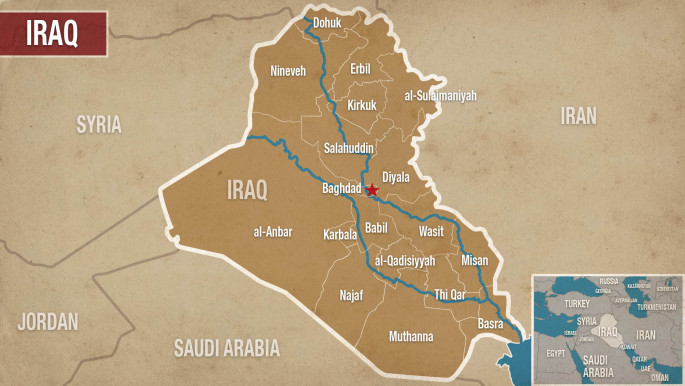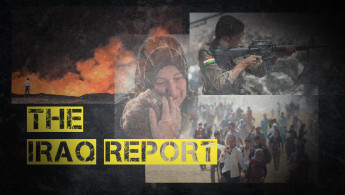The Iraq Report: ‘Victory’ over IS, while human rights slip
Click here to receive The Iraq Report each week in your inbox
The Iraqi government has finally declared victory over the forces of the Islamic State group, having fought against the militants in brutal combat for nearly four years. At one point, IS controlled almost a third of Iraq across northern and western governorates, but the group has since been forced out of all its territorial holdings. However, concerns have arisen that the declaration of victory was a political stunt.
Meanwhile, other groups accused of war crimes, including Iran-backed Shia militias, continue to expand their power across the country. With elections looming, these militants are keen on stamping their authority, and have been making threats not only to the United States – who played an enormous role in the anti-IS campaign – but also against Israel. These threats are unlikely to be serious, but are designed to garner popular support in the face of the recent American decision to recognise Jerusalem as the capital of Israel.
‘Victory’ over IS more about gaining votes
Iraqi Prime Minister Haider al-Abadi declared victory over the Islamic State group on Saturday, ostensibly ending a more-than three-year war that has cost hundreds of billions of dollars and affected the lives of millions of Iraqis.
Iraq held a large military victory parade on Monday in celebration of the prime minister’s declaration, but the head of the US-led coalition warned that there was still much work to be done before terrorism was defeated in the country.
 |
IS held almost a third of Iraq at the peak of its “caliphate”, but the group has gradually been worn down |  |
Although the group had existed in Iraq for some time, IS first came to mainstream attention after capturing a number of major cities, including Mosul, in the summer of 2014. IS is suspected to have perpetrated grave war crimes against most of Iraq’s various ethnic and religious groups, most notably against the Yazidi minority.
IS held almost a third of Iraq at the peak of its “caliphate”, but the group has gradually been worn down by Iraqi forces which included pro-Iran Shia Islamist militants, who themselves have been accused of sectarian atrocities and war crimes. The United States-led international coalition provided extensive air support not only to Iraqi forces, but also to Shia militias within the Popular Mobilisation Forces - Iran proxies who are also now counted as a part of the Iraqi armed forces.
IS now holds no territory in Iraq after having lost its last strongholds in Iraq’s western Anbar governorate in recent weeks. It still poses a significant security threat, however, having carried out numerous attacks in even supposedly secure cities such as the capital, Baghdad.
With IS most likely to revert to low-cost, low-intensity asymmetric and guerrilla warfare, it is unlikely the world has seen the last of the group in Iraq. Analysts have repeatedly warned that IS would no longer seek to face Iraqi forces in pitched battle, but will instead seek to destabilise the country and conduct more traditional terrorist attacks.
It is therefore highly likely that Abadi’s declaration of victory has more to do with the upcoming elections and gaining enough votes for a second term, and less to do with the actual military and security situation on the ground.
Thousands of IS fighters and commanders are still at large, and many of their units withdrew from places such as Rawa, Ana and even Hawija, seeking refuge either in remote deserts or in the Hamrin mountain range. Without a comprehensive political and social solution to Iraq’s divisions, Abadi’s speeches regarding “unity” may not be much more than rhetoric.
 |
Rights abuses and sectarianism still a significant concern
With more than three million Iraqis – mostly Sunni Arabs – displaced by the fighting and with very little access to government services, there is an enormous risk that the social and political sectarianism that led to the rise of IS in the first place may lead to a resurgence for the group or other militants.
Feelings of resentment and marginalisation will likely be further exacerbated as little is done to address human rights concerns. Human Rights Watch released a 76-page report on Tuesday detailing how some 20,000 Iraqis accused of being IS members are facing widespread rights violations in Iraqi custody.
According to the rights watchdog, suspects are often held in inhumane conditions, facing torture, abuse, denied access to lawyers and their families are denied information of their whereabouts. Some 92 of these suspects have been executed, their right to due process denied to them, raising significant concern about their culpability for crimes and acts of terrorism.
Using terrorism as a political tool to marginalise and persecute communities – particularly Sunni Arabs – has long been a problem in Iraq. Widespread protests broke out in 2013 demanding a change to the draconian Anti-Terrorism Law, which gave authorities broad powers to arrest and detain people based on vague definitions of acts of terror. This empowered sectarian Shia-dominated police forces to incarcerate relatives of militants or political opponents, many of whom were placed on death row.
The highly unpopular law has yet to be repealed, and is still being exploited by authorities in its original capacity, fuelling further resentment and discontent. If the human rights situation in Iraq is not addressed, and steps taken to unify all Iraqis no matter their ethnic and sectarian affiliation, there likely will be further turmoil in the future.
Iraq Shia militants tour Lebanese-Israeli border
It is not only Iraqi politicians attempting to further entrench their power in the upcoming elections, but also Shia Islamist militants who are seeking to use their role in the fight against IS to claim political power for themselves.
Shia militant groups have combined their anti-IS credentials with US President Donald Trump’s highly unpopular announcement that his administration would recognise Jerusalem as the capital of Israel to jockey for the affections of voters by threatening violence both against the United States and Israel.
Akram al-Kaabi, the leader of the Iran-backed Harakat Hizballah al-Nujaba, said “Trump’s stupid decision to make Jerusalem a capital for the Zionists will be the big spark for removing this entity from the body of the Islamic nation, and a legitimate reason to target American forces.”
Another close Iran ally, leading Shia Islamist cleric and militia leader, Qais al-Khaz’ali, was filmed touring the Lebanese-Israeli border with Lebanese Hizballah militants a week ago, sparking outrage among Lebanese leaders.
Twitter Post
|
Khaz’ali, who heads the Asaib Ahl ul-Haq militant group, was apparently there to send a “clear message” to Israel.
Lebanese Prime Minister Saad al-Hariri accused the Iraqi militant on Saturday of violating Lebanese law, highlighting the presence of the Iranian-backed Khaz’ali as a further example of Tehran’s “meddling” in Lebanon.
AAH and other militants have now formed political parties and are making preparations to take part in the upcoming local and national elections in May 2018. Although Prime Minister Abadi has stated that he has forbidden armed groups from taking part, he had previously also said they would play no role in the Mosul operation - but was seemingly over-ruled by Iran.
Major oil city now ‘ghost town’ years after liberation
Two years after Islamic State militants were forced from the one-time industrial hub of Baiji, the city remains a devastated ghost town as government pledges of funds to rebuild the city have failed to materialise.
Baiji was once home to Iraq’s largest oil refinery, but vicious fighting in and around the facility has left the city in ruins. Baiji was declared a disaster site by the Iraqi parliament in 2016, as the city’s population of almost 180,000 have been unable to return, with 90 percent of Baiji in ruins.
The refinery was built in 1975 and once produced 250,000 barrels of oil per day, but is now entirely incapacitated, having suffered from the effects of war. Much of the refinery was looted by Shia militias, with parts moved further south and then sold on to smugglers on the black market.
An official from the Iraqi North Oil Company told AFP it would be “very difficult to rehabilitate the Baiji refinery…as so much equipment has been pillaged”. Even if the facility does get up and running again, “it won’t have the same capacity as before”.
Iraq’s oil infrastructure is key to the country’s survival as a state, as Iraq produces almost nothing of economic value except for its oil exports. With Baiji completely devastated and with Baghdad’s reticence in providing the necessary funding to support its rebuilding, hundreds of thousands of lives will be affected and jobs lost. Most of Baiji’s population will be reliant on foreign aid, with the luckiest of them having escaped to relatives elsewhere in the country.
The Iraq Report is a weekly feature at The New Arab.
Click here to receive The Iraq Report each week in your inbox
Follow us on Twitter: @The_NewArab



